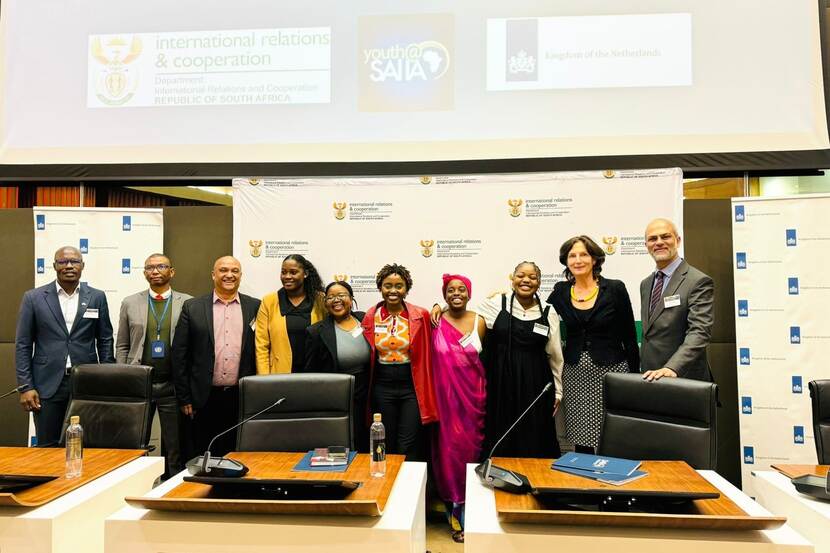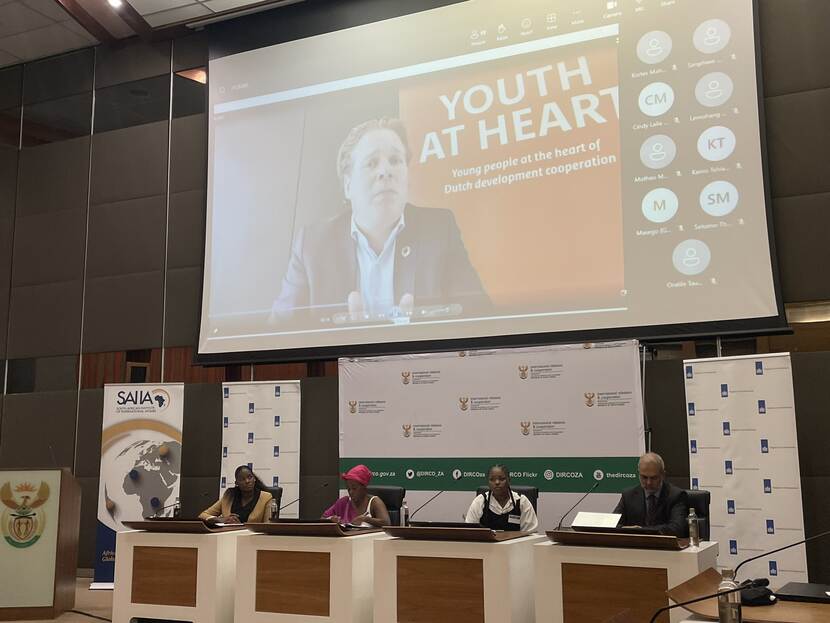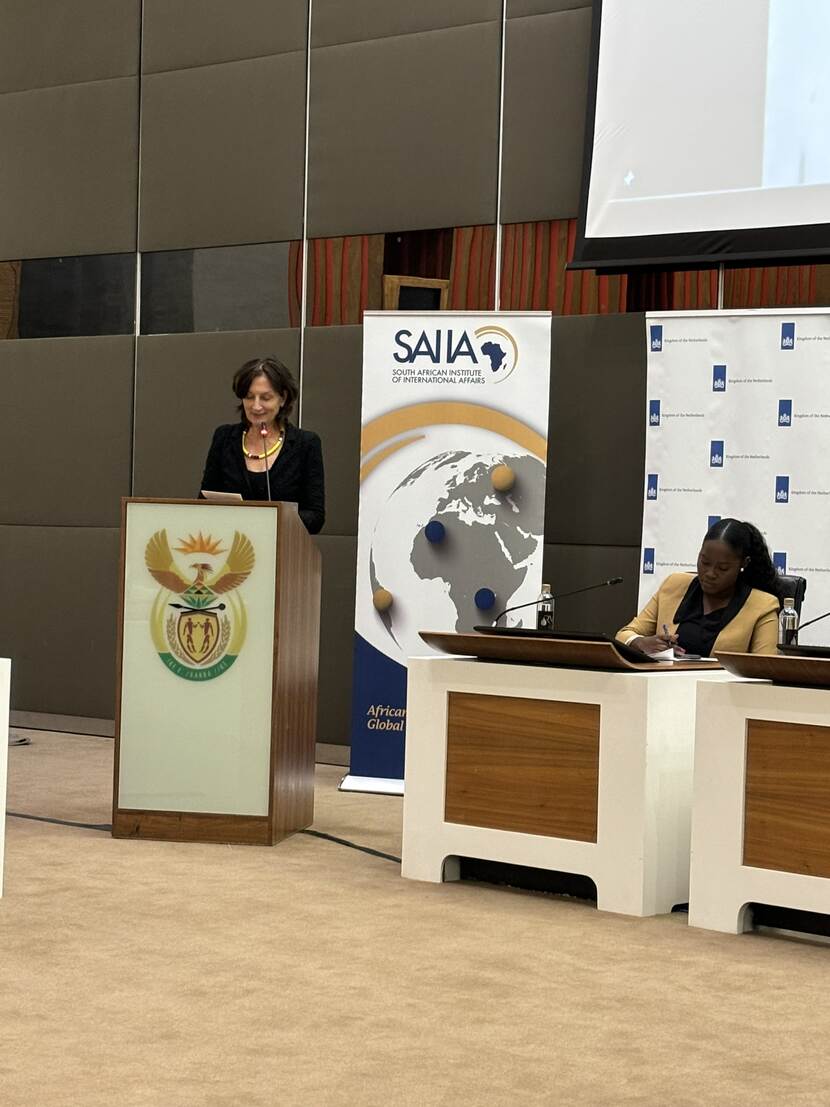Netherlands Embassy in Pretoria Commemorates South Africa’s Youth Month by Hosting a Dialogue on Youth, Peace and Security
On the 20th of June 2024, the Embassy in Pretoria, South Africa’s Department of International Relations and Cooperation (DIRCO) and NGO South African Institute of International Affairs (SAIIA-Youth) co-hosted a dialogue themed Youth as Solution Seekers on the African Continent. This was one of the two events hosted by the Embassy to commemorate South Africa’s Youth Month. Read their story below!

Commemorating Soweto Youth Uprising
South Africa celebrates youth day on the 16th of June every year to commemorate the Soweto Youth Uprising where an estimated 176 school children were massacred. The uprising started in Soweto in 1976 in protest against the Apartheid government and it profoundly changed South Africa’s socio-political landscape.
Our recurring YPS event with DIRCO was initiated in 2019 and signifies the strong collaboration between Netherlands and South Africa for giving meaning to Resolution 2250 (Youth Peace and Security (YPS). This year’s event highlighted the challenges faced by youth. Furthermore, it served as a moment for knowledge sharing on amplifying the voices of youth, their representation, and inclusion.
The theme of this event recognized the vital contribution of young persons towards the attainment of SDG 16. It sought to shift perception away from youth as trouble makers, a mischaracterization born out of the recruitment of youth in terrorism and armed violence.

Panel Discussion and Remarks
In his recorded opening address, the Dutch Ambassador for Youth, Education and Work, Jurriaan Middelhoff, argued: 'We must move away from the dualistic perception of youth as only either victims or perpetrators of violence. Because young persons have been and continue to be positive drivers of change and have been at the forefront of peace processes.' This, too, is a quintessential part of the Youth at Heart Strategy, which sees young persons as positive drivers for change.
Youth, Peace and Security
So, what was discussed during the event? Most importantly, the progression of the peace agenda and the role of youth. The African Union (AU) defines Youth, Peace and Security (YPS) as 'conscious actions and processes to protect young persons from participation in, and the ill effects of, violent conflicts and insecurity, and to promote and support their contributions to peace efforts in conflict and post-conflict situations.'
They aim to encompass protection, prevention, and peacebuilding. This means measures to address root causes of conflict must be youth-centric. The YPS agenda allows us to simultaneously address the intersectional root causes of violence. While a lot of progress has been made, more needs to be done to ensure not just representation, but meaningful youth participation.
The land-mark UNSC resolution 2250 calls for youth inclusion in peace processes along five pillars of participation: prevention, protection, partnership, disengagement and integration. Additionally, in order to be sustainable, peacebuilding efforts must involve those most effected by conflict and violence. During the event, participants celebrated this, but also called for greater inclusion of youth in peace building on the African continent and at the UN.

The Dutch Embassy and YPS
The event provided a platform where youth can express themselves openly and freely; something that is central to the work of the Embassy in Pretoria. Through the event, youth challenged YPS framing that fails to address structural violence. South Africa as an example, they argued, is hardly classified as a country in conflict. Yet, it has one of the highest rates of murders and violent crimes in the world. Young women don’t feel safe on the street, which intersects with problems like poverty, economic exclusion, and high levels of inequality.
While YPS is an important spearpoint of the UN agenda, it’s also much more than that. As observed by Ambassador Middelhoff, it entails a change in mindset on how we think about peace and security at local, regional and national levels.
Gap Between Theory and Reality
Ms Cynthia Chigwenya – a YPS expert and former African Union Youth Ambassador for Southern Africa – lamented the huge gap between what is on paper and what materializes on the ground. She observed that only five countries worldwide – of which two are in Africa (Nigeria and DRC) – have domesticated YPS through National Action Plans.
Youth in attendance warned against YPS becoming a new instance of tokenism. It is important to integrate youth in all conversations, they said, for example through accessible language and framing. As one participant put it, we must speak in a language that young persons understand. Many other impediments to youth participation were identified and expressed, including financial barriers.

The dialogue on YPS identified global trends that threaten meaningful youth involvement in peace a security. These included democratic regression, push pack against women’s right, and misinformation and disinformation, amongst others. These insights validate the embassy’ focus on YPS, which relate to countering disinformation, cyber security, and youth focused civic education. The event provided a great deal of information to the embassy for tailoring running programs to the demands of youth itself.
Acknowledgement as Sixth Pillar
One of the youth advisers of the embassy, Kopano Moraka, argued for ‘acknowledgement’ as an additional pillar in the YPS Agenda. Acknowledging the youth participation that has already been present paves way for generational healing as it addresses policies that young people have already contributed to.
Furthermore, most young persons in attendance agreed that intergenerational dialogues should be sought after, rather than pitting the new against the old. In the words of Ambassador Jurriaan, YPS requires intergenerational trust. It was agreed that, to achieve change, youth inevitably need to engage with those in positions of power.
All in all, the discussions succeeded in providing a platform for sharing of experiences on efforts to enhance representation, inclusion, and amplifying the voices of youth. In her concluding remarks, Ambassador to Pretoria Joanne Doornewaard reminded the youth that the Netherlands is only a partner: it rests upon them to organize, and claim their seat at the table.
